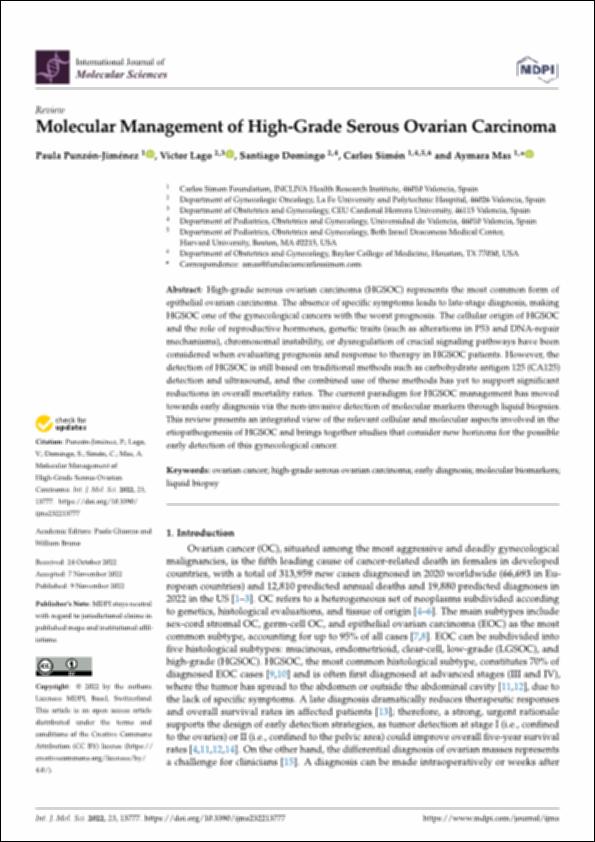Please use this identifier to cite or link to this item:
http://hdl.handle.net/10637/14410Molecular management of high-grade serous ovarian carcinoma
| Title: | Molecular management of high-grade serous ovarian carcinoma |
| Authors : | Punzón Jiménez, Paula Lago Leal, Víctor Domingo del Pozo, Santiago Simón Vallés, Carlos Mas Perucho, Aymara |
| Keywords: | Ovarios - Biopsia.; Ovaries - Cancer - Diagnosis.; Tumor markers.; Ovaries - Biopsy.; Marcadores tumorales.; Ovarios - Cáncer - Diagnóstico. |
| Publisher: | MDPI |
| Citation: | Punzón-Jiménez, P., Lago, V., Domingo, S., Simón, C. & Mas, A. (2022). Molecular management of high-grade serous ovarian carcinoma. International Journal of Molecular Sciences, vol. 23, i. 22 (09 nov.), art. 13777. DOI: https://doi.org/10.3390/ijms232213777 |
| Abstract: | High-grade serous ovarian carcinoma (HGSOC) represents the most common form of epithelial ovarian carcinoma. The absence of specific symptoms leads to late-stage diagnosis, making HGSOC one of the gynecological cancers with the worst prognosis. The cellular origin of HGSOC and the role of reproductive hormones, genetic traits (such as alterations in P53 and DNA-repair mechanisms), chromosomal instability, or dysregulation of crucial signaling pathways have been considered when evaluating prognosis and response to therapy in HGSOC patients. However, the detection of HGSOC is still based on traditional methods such as carbohydrate antigen 125 (CA125) detection and ultrasound, and the combined use of these methods has yet to support significant reductions in overall mortality rates. The current paradigm for HGSOC management has moved towards early diagnosis via the non-invasive detection of molecular markers through liquid biopsies. This review presents an integrated view of the relevant cellular and molecular aspects involved in the etiopathogenesis of HGSOC and brings together studies that consider new horizons for the possible early detection of this gynecological cancer. |
| Description: | Este artículo se encuentra disponible en la siguiente URL: https://www.mdpi.com/1422-0067/23/22/13777 Este artículo de investigación pertenece al número especial "Molecular Advances in Cancer Genetics 2.0". |
| URI: | http://hdl.handle.net/10637/14410 |
| Rights : | http://creativecommons.org/licenses/by/4.0/deed.es |
| ISSN: | 1422-0067 (Electrónico) |
| Language: | es |
| Issue Date: | 9-Nov-2022 |
| Center : | Universidad Cardenal Herrera-CEU |
| Appears in Collections: | Dpto. Medicina y Cirugía |
Items in DSpace are protected by copyright, with all rights reserved, unless otherwise indicated.


